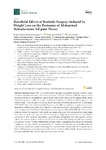Mostrar el registro sencillo del ítem
Beneficial effects of bariatric surgery-induced by weight loss on the proteome of abdominal subcutaneous adipose tissue
| dc.contributor.author | Varela-Rodríguez, Bárbara María | |
| dc.contributor.author | Juiz-Valiña, Paula | |
| dc.contributor.author | Varela, Luis | |
| dc.contributor.author | Outeiriño-Blanco, Elena | |
| dc.contributor.author | García-Brao, María Jesús | |
| dc.contributor.author | Mena, Enrique | |
| dc.contributor.author | Noguera, José Francisco | |
| dc.contributor.author | Valero-Gasalla, Javier | |
| dc.contributor.author | Cordido, Fernando | |
| dc.contributor.author | Sangiao-Alvarellos, Susana | |
| dc.contributor.author | Bravo López, Susana Belén | |
| dc.date.accessioned | 2021-10-01T08:10:18Z | |
| dc.date.available | 2021-10-01T08:10:18Z | |
| dc.date.issued | 2020-01-13 | |
| dc.identifier.citation | Varela-Rodríguez BM, Juiz-Valiña P, Varela L, Outeiriño-Blanco E, Belén Bravo S, García-Brao MJ, et al. Beneficial effects of bariatric surgery-induced by weight loss on the proteome of abdominal subcutaneous adipose tissue. J Clin Med. 2020;9(1):213 | es_ES |
| dc.identifier.issn | 2077-0383 | |
| dc.identifier.uri | http://hdl.handle.net/2183/28546 | |
| dc.description.abstract | [Abstract] Bariatric surgery (BS) is the most effective treatment for obesity and has a positive impact on cardiometabolic risk and in the remission of type 2 diabetes. Following BS, the majority of fat mass is lost from the subcutaneous adipose tissue depot (SAT). However, the changes in this depot and functions and as well as its relative contribution to the beneficial effects of this surgery are still controversial. With the aim of studying altered proteins and molecular pathways in abdominal SAT (aSAT) after body weight normalization induced by BS, we carried out a proteomic approach sequential window acquisition of all theoretical mass spectra (SWATH-MS) analysis. These results were complemented by Western blot, electron microscopy and RT-qPCR. With all of the working tools mentioned, we confirmed that after BS, up-regulated proteins were associated with metabolism, the citric acid cycle and respiratory electron transport, triglyceride catabolism and metabolism, formation of ATP, pyruvate metabolism, glycolysis/gluconeogenesis and thermogenesis among others. In contrast, proteins with decreased values are part of the biological pathways related to the immune system. We also confirmed that obesity caused a significant decrease in mitochondrial density and coverage, which was corrected by BS. Together, these findings reveal specific molecular mechanisms, genes and proteins that improve adipose tissue function after BS characterized by lower inflammation, increased glucose uptake, higher insulin sensitivity, higher de novo lipogenesis, increased mitochondrial function and decreased adipocyte size. | es_ES |
| dc.description.sponsorship | The results of this work have been funded by the Projects: Nº PI16/00884 to F.C. and S.S-A. integrated in the National Plan for Scientific Research, Development and Technological Innovation 2013–2016 and funded by the ISCIII (Instituto de Salud Carlos III)- General Subdirection of Assessment and Promotion of the Research–European Regional Development Fund (FEDER) “A way of making Europe”, and Nº EM2013/011 to S.S.A. integrated in Plan I2C and funded by the Consellería de Cultura, Educación e Ordenación Universitaria (Xunta de Galicia, Spain). | es_ES |
| dc.description.sponsorship | Xunta de Galicia; EM2013/011 | es_ES |
| dc.description.sponsorship | info:eu-repo/grantAgreement/MINECO/Programa Estatal de I+D+I Orientada a los Retos de la Sociedad/PI16%2F00884/ES/RELACION ENTRE MARCADORES HORMONALES DE CONTROL DE LA INGESTA Y GASTO METABÓLICO. EFECTO DEL BALANCE ENERGÉTICO NEGATIVO Y LA MODIFICACIÓN DE GH | |
| dc.language.iso | eng | es_ES |
| dc.publisher | MDPI | es_ES |
| dc.relation.uri | https://doi.org/10.3390/jcm9010213 | es_ES |
| dc.rights | Creative Commons Attribution 4.0 International License (CC-BY 4.0) | es_ES |
| dc.rights.uri | http://creativecommons.org/licenses/by/4.0/ | * |
| dc.subject | Bariatric surgery | es_ES |
| dc.subject | Proteome | es_ES |
| dc.subject | Abdominal adipose tissue | es_ES |
| dc.subject | Lipogenesis | es_ES |
| dc.subject | Mitochondria | es_ES |
| dc.subject | Metabolism | es_ES |
| dc.subject | Immune system | es_ES |
| dc.title | Beneficial effects of bariatric surgery-induced by weight loss on the proteome of abdominal subcutaneous adipose tissue | es_ES |
| dc.type | journal article | es_ES |
| dc.rights.accessRights | open access | es_ES |
| UDC.journalTitle | Journal of Clinical Medicine | es_ES |
| UDC.volume | 9 | es_ES |
| UDC.issue | 1 | es_ES |
| UDC.startPage | 213 | es_ES |
| UDC.coleccion | Investigación | es_ES |
| UDC.departamento | Fisioterapia, Medicina e Ciencias Biomédicas | es_ES |
| UDC.grupoInv | Grupo Fisiopatoloxía Endócrina, Nutricional e Médica (FENM) | es_ES |
| UDC.grupoInv | Enfermidades Endocrinas, Nutricionais e Metabólicas (INIBIC) | es_ES |
| UDC.institutoCentro | INIBIC - Instituto de Investigacións Biomédicas de A Coruña | es_ES |
Ficheros en el ítem
Este ítem aparece en la(s) siguiente(s) colección(ones)
-
Investigación (FCS) [1293]






